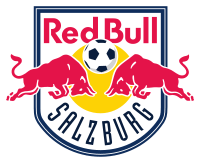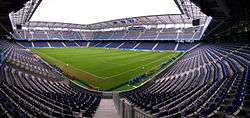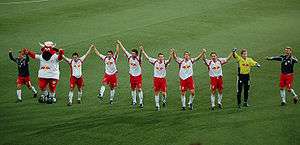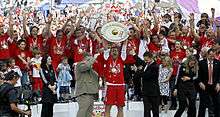FC Red Bull Salzburg
 | ||||
| Full name | Football Club Red Bull Salzburg | |||
|---|---|---|---|---|
| Nickname(s) | Die Roten Bullen (The Red Bulls) | |||
| Founded | 13 September 1933 | |||
| Ground |
Red Bull Arena Wals-Siezenheim Austria | |||
| Capacity | 31,000[1] | |||
| Owner | Red Bull GmbH | |||
| Chairman | Georgios Esplandatkoulos | |||
| Manager | Óscar García | |||
| League | Austrian Bundesliga | |||
| 2015–16 | Austrian Bundesliga, 1st | |||
|
| ||||
FC Red Bull Salzburg is an Austrian association football club, based in Wals-Siezenheim. Their home ground is the Red Bull Arena. Due to sponsorship restrictions, the club is known as FC Salzburg and wears a modified crest when playing in UEFA competitions.[2]
The club was known as SV Austria Salzburg, and had several sponsored names, before being bought by Red Bull GmbH in 2005 who renamed the club and changed its colours from its traditional violet and white to red and white. The change resulted in some of the team's fans forming a new club, SV Austria Salzburg.
Founded in 1933, and refounded in 2005 as Red Bull Salzburg, the club won its first Austrian Bundesliga in 1994, which was the first of three in the space of four seasons which also saw them reach the 1994 UEFA Cup Final. The team currently has 10 league titles to its name, and four Austrian Cups, all of which came as doubles.
History
Pre-Red Bull
FC Red Bull Salzburg was founded on 13 September 1933 as SV Austria Salzburg, after the merger of the city's two clubs, Hertha and Rapid.[3] In 1950, the club was dissolved but re-founded later the same year. It reached the Austrian top flight in 1953,[2] and finished 9th of 14 clubs in its first season there, avoiding relegation by five points.[4] Vienna-born Erich Probst was Salzburg's first-ever international, earning the last of his 19 Austrian caps on 27 March 1960.[5] Adolf Macek, who made the first of his four international appearances on 9 October 1965, was the club's first local player to earn a cap for Austria.[6]
Salzburg were top-flight runners-up for the first time in the 1970–71 season, gaining 43 points to Wacker Innsbruck's 44.[7] The club's first-ever European campaign was in the 1971-72 UEFA Cup, and it was eliminated 5–4 on aggregate by Romanian club UTA despite a 3–1 home victory in the second leg.[8] In 1974, Salzburg reached the Austrian Cup final for the first time, and lost 2–1 away to Austria Vienna in the first leg before a 1–1 home draw in the second.[9]

In 1978, the official name was changed to SV Casino Salzburg and in 1997, to SV Wüstenrot Salzburg, due to a sponsorship deal with an Austrian financial services corporation. The team often remained referred to as SV Austria Salzburg. During the Casino era, Salzburg reached their first and so far only European final, the 1994 UEFA Cup Final, where they lost both legs 1–0 to Italian club Inter Milan.[10] That same season, Salzburg won their first Bundesliga title, beating Austria Vienna by 51 points to 49.[11] The title was retained the following season as Salzburg beat Sturm Graz on goal difference.[12] The 1995–96 season saw a drop to eighth place, one above a relegation play-off,[13] but the club's third title in four seasons was won in 1997 as they beat holders Rapid Vienna by three points.[14]
Salzburg's inaugural UEFA Champions League campaign in 1994–95 saw them reach the group stage by beating Israel's Maccabi Haifa 5–2 on aggregate.[15] They were drawn into Group D with holders and eventual finalists AC Milan and eventual winners Ajax Amsterdam, as well as AEK Athens. Despite drawing both matches with Ajax, Salzburg picked up a solitary 3–1 win away in Athens and were eliminated in third place.[16]
The club moved to its current stadium in 2003.[2]
The Red Bull takeover

The Red Bull company bought the club on 6 April 2005 and rebranded it. After the takeover, Red Bull changed the club's name, management, and staff, declaring "this is a new club with no history." Red Bull initially claimed on the club website that the club was founded in 2005, but was ordered to remove this claim by the Austrian Football Association. The new authority removed all trace of violet from the club logo and the team now play in the colours of red and white, to the consternation of much of the club's traditional support.[17] A small pair of wings form the motif of the new club crest, displayed on the team jersey, in accordance with Red Bull's commercial slogan at the time: "gives you wings." This complete re-branding of the team proved very similar to Red Bull's treatment of its two Formula One racing teams, Red Bull Racing and Scuderia Toro Rosso. However, Red Bull would not completely follow this precedent when it acquired the MetroStars club in Major League Soccer in the United States; while it rebranded the team as the New York Red Bulls, it chose to recognise the MetroStars' history.

The traditional supporters tried to resist the radical changes and formed their own movement in order to regain some of the tradition. Several fan-clubs throughout Europe voiced their support in what they saw as a fight against the growing commercialisation of football. However, after five months of protests and talks between the club owners and traditional fans, no compromise was reached. On 15 September 2005, the 'violet' supporters stated that the talks had irreversibly broken down and efforts to reach an agreement would be terminated.
This gave rise to two separate fan groups: the 'Red-Whites', who support 'Red Bull Salzburg' and the 'Violet-Whites', who want to preserve the 72-year-old tradition and refuse to support the rebranded club. The Violet-Whites ultimately formed a new club, SV Austria Salzburg.
Red Bull era
In May 2006, Red Bull announced on their website that they had hired veteran Italian coach Giovanni Trapattoni, together with his former player, German World Cup winner Lothar Matthäus, as co-trainers. The pair initially denied having reached a deal, but officially signed on 23 May 2006. Red Bull ultimately won the 2006–07 T-Mobile Bundesliga by a comfortable margin with five games still left in the season after drawing 2–2 with previous season's champions Austria Wien on 28 April 2007.
Red Bull were beaten by Shakhtar Donetsk in the third qualifying round[18][19] of the 2007–08 UEFA Champions League, and were then knocked out of the 2007–08 UEFA Cup in the first round by AEK Athens. On 13 February 2008, Italian manager Giovanni Trapattoni confirmed that he would be taking over as the new Republic of Ireland manager in May. In his final season, the club finished as runners-up, six points behind champions Rapid Vienna.[20] Trapattoni was succeeded by Co Adriaanse, under whom they finished as champions, but he left after one year. His successor was Huub Stevens. On 14 May 2010, Stevens' Red Bull retained the Bundesliga.[21]
Stevens was replaced by Dutchman Ricardo Moniz at the end of the 2010–11 season, in which Red Bull were denied a third consecutive title by Sturm Graz, who won the league by a three-point margin.[22] Red Bull finished second in the league, and qualified for the following season's UEFA Europa League. Moniz was ordered to integrate young players from the Junior squad: at the beginning of the 2011–12 season Daniel Offenbacher, Martin Hinteregger, Georg Teigl and Marco Meilinger were promoted to the first team. In the 2011–12 season Red Bull won the Austrian Bundesliga league title and Cup double.
After the 2011–12 season Moniz departed his post despite having a year remaining on his contract. The new coach for the 2012–13 season was Roger Schmidt, who came from Paderborn of the German 2. Bundesliga. In July 2012, Red Bull were knocked out of the Champions League in the second qualifying round against F91 Dudelange of Luxembourg, losing the first leg 1–0 away, followed by a 4–3 home win which saw the club eliminated on away goals.[23]
After that, the team was changed fundamentally. At the end of the transfer period new players were bought (Valon Berisha, Kevin Kampl, Håvard Nielsen, Sadio Mané, Isaac Vorsah, Rodnei). In the 2012–13 season the team finished second in the league behind champion FK Austria Wien. They recaptured the league title the following season, with an 11-point margin over the runners-up. Also in the 2014/15 season they won both the league and the cup.
Honours
- Champions (10): 1993–94*, 1994–95*, 1996–97*, 2006–07, 2008–09, 2009–10, 2011–12, 2013–14, 2014–15, 2015–16
- Runners-up (4): 2005–06, 2007–08, 2010–11, 2012–13
- Winners (4): 2011–12, 2013–14, 2014–15, 2015–16
- Runners-up (4): 1973–74*, 1979–80*, 1980–81*, 1999–2000*
- Winners (2): 1977–78*, 1986–87*
- Runners-up (1): 1993–94*
* as Casino Salzburg
European competition history
- Q = Qualification
- PO = Play-Off
- QF = Quarter-final
- SF = Semi-final
| Season | Competition | Round | Country | Club | Home | Away | Aggregate |
|---|---|---|---|---|---|---|---|
| 1971–72 | UEFA Cup | 1 | UT Arad | 3–1 | 1–4 | 4–5 | |
| 1976–77 | UEFA Cup | 1 | Adanaspor | 5–0 | 0–2 | 5–2 | |
| 2 | Crvena Zvezda | 2–1 | 0–1 | 2–2 | |||
| 1980–81 | UEFA Cup Winners' Cup | 1 | Fortuna Düsseldorf | 0–3 | 0–5 | 0–8 | |
| 1992–93 | UEFA Cup | 1 | Ajax | 0–3 | 1–3 | 1–6 | |
| 1993–94 | UEFA Cup | 1 | DAC Dunajska Streda | 2–0 | 2–0 | 4–0 | |
| 2 | Royal Antwerp | 1–0 | 1–0 | 2–0 | |||
| 3 | Sporting CP | 3–0 (aet) | 0–2 | 3–2 | |||
| QF | Eintracht Frankfurt | 1–0 | 5–4 (pen.) | 6–4 | |||
| SF | Karlsruhe | 0–0 | 1–1 | 1–1 | |||
| Final | Internazionale | 0–1 | 0–1 | 0–2 | |||
| 1994–95 | UEFA Champions League | Q1 | Maccabi Haifa | 3–1 | 2–1 | 5–2 | |
| Group D | AEK Athens | 0–0 | 3–1 | ||||
| Milan | 0–1 | 0–3 | |||||
| Ajax | 0–0 | 1–1 | |||||
| 1995–96 | UEFA Champions League | Q1 | Steaua Bucureşti | 0–0 | 0–1 | 0–1 | |
| 1997–98 | UEFA Champions League | Q1 | Sparta Prague | 0–0 | 0–3 | 0–3 | |
| 1997–98 | UEFA Cup | 1 | Anderlecht | 4–3 | 2–4 | 6–7 | |
| 1998 | UEFA Intertoto Cup | 2 | St. Gallen | 3–1 | 0–1 | 3–2 | |
| 3 | Twente | 3–1 | 2–2 | 5–3 | |||
| 4 | Fortuna Sittard | 3–1 | 1–2 | 4–3 | |||
| 5 | Valencia | 0–2 | 1–2 | 1–4 | |||
| 2000 | UEFA Intertoto Cup | 2 | Nistru Otaci | 1–1 | 6–2 | 7–3 | |
| 3 | Standard Liége | 1–1 | 1–3 | 2–4 | |||
| 2003–04 | UEFA Cup | 1 | Udinese | 0–1 | 2–1 | 2–2 | |
| 2 | Parma | 0–4 | 0–5 | 0–9 | |||
| 2006–07 | UEFA Champions League | Q2 | Zürich | 2–0 | 1–2 | 3–2 | |
| Q3 | Valencia | 1–0 | 0–3 | 1–3 | |||
| 2006–07 | UEFA Cup | 1 | Blackburn Rovers | 2–2 | 0–2 | 2–4 | |
| 2007–08 | UEFA Champions League | Q2 | Ventspils | 4–0 | 3–0 | 7–0 | |
| Q3 | Shakhtar Donetsk | 1–0 | 1–3 | 2–3 | |||
| 2007–08 | UEFA Cup | 1 | AEK Athens | 1–0 | 0–3 | 1–3 | |
| 2008–09 | UEFA Cup | Q1 | Banants | 7–0 | 3–0 | 10–0 | |
| Q2 | Suduva Marijampole | 0–1 | 4–1 | 4–2 | |||
| 1 | Sevilla | 0–2 | 0–2 | 0–4 | |||
| 2009–10 | UEFA Champions League | Q2 | Bohemians | 1–1 | 1–0 | 2–1 | |
| Q3 | Dinamo Zagreb | 1–1 | 2–1 | 3–2 | |||
| PO | Maccabi Haifa | 1–2 | 0–3 | 1–5 | |||
| 2009–10 | UEFA Europa League | Group G | Lazio | 2–1 | 2–1 | ||
| Villarreal | 2–0 | 1–0 | |||||
| Levski Sofia | 1–0 | 1–0 | |||||
| Round of 32 | Standard Liege | 0–0 | 2–3 | 2–3 | |||
| 2010–11 | UEFA Champions League | Q2 | HB Tórshavn | 5–0 | 0–1 | 5–1 | |
| Q3 | Omonia | 4–1 | 1–1 | 5–2 | |||
| PO | Hapoel Tel Aviv | 2–3 | 1–1 | 3–4 | |||
| 2010–11 | UEFA Europa League | Group A | Manchester City | 0–2 | 0–3 | ||
| Lech Poznan | 0–1 | 0–2 | |||||
| Juventus | 1–1 | 0–0 | |||||
| 2011–12 | UEFA Europa League | Q2 | FK Liepājas Metalurgs | 4–1 | 0–0 | 4–1 | |
| Q3 | FK Senica | 1–0 | 3–0 | 4–0 | |||
| PO | Omonia | 1–0 | 1–2 | 2–2 | |||
| Group F | Slovan Bratislava | 3–0 | 3–2 | ||||
| Athletic Bilbao | 0–1 | 2–2 | |||||
| Paris Saint-Germain | 2–0 | 1–3 | |||||
| Round of 32 | Metalist Kharkiv | 0–4 | 1–4 | 1–8 | |||
| 2012–13 | UEFA Champions League | Q2 | Dudelange | 4–3 | 0–1 | 4–4 | |
| 2013–14 | UEFA Champions League | Q3 | Fenerbahçe | 1–1 | 1–3 | 2–4 | |
| 2013–14 | UEFA Europa League | PO | Žalgiris Vilnius | 5–0 | 2–0 | 7–0 | |
| Group C | IF Elfsborg | 4–0 | 1–0 | ||||
| Esbjerg fB | 3–0 | 2–1 | |||||
| Standard Liège | 2–1 | 3–1 | |||||
| Round of 32 | Ajax | 3–1 | 3–0 | 6–1 | |||
| Round of 16 | Basel | 1–2 | 0–0 | 1–2 | |||
| 2014–15 | UEFA Champions League | 3Q | |
Qarabağ | 2–0 | 1–2 | 3–2 |
| PO | |
Malmö FF | 2–1 | 0–3 | 2–4 | ||
| 2014–15 | UEFA Europa League | Group D | Celtic | 2–2 | 3–1 | ||
| Astra Giurgiu | 5–1 | 2–1 | |||||
| Dinamo Zagreb | 4–2 | 5–1 | |||||
| Round of 32 | Villarreal | 1–3 | 1–2 | 2–5 | |||
| 2015–16 | UEFA Champions League | 3Q | |
Malmö FF | 2–0 | 0–3 | 2–3 |
| 2015–16 | UEFA Europa League | PO | |
Dinamo Minsk | 2–0 | 0–2 | 2–2 (2–3 p.) |
| 2016–17 | UEFA Champions League | 2Q | |
FK Liepāja | 1–0 | 2–0 | 3–0 |
| 3Q | |
Partizani Tirana | 2–0 | 1–0 | 3–0 | ||
| PO | |
Dinamo Zagreb | 1–2 (aet) | 1–1 | 2–3 | ||
Gallery
 Champions 2006–07
Champions 2006–07 Champions 2008–09
Champions 2008–09- Champions 2009–10
.jpg) Champions 2011–12
Champions 2011–12- Champions 2013-14
- Champions 2014-15
.jpg) Austrian Cup 2012
Austrian Cup 2012- Austrian Cup 2015
Players
Current squad
- As of 8 September 2016
Note: Flags indicate national team as defined under FIFA eligibility rules. Players may hold more than one non-FIFA nationality.
|
|
Out on loan
Note: Flags indicate national team as defined under FIFA eligibility rules. Players may hold more than one non-FIFA nationality.
|
|
Coaching staff
- Head coach – Óscar García
- Assistant coaches – Ruben Martinez, Richard Kitzbichler, Gerhard Struber, René Aufhauser
- Goalkeeping coach – Herbert Ilsanker, Heinz Arzberger
FC Liefering squad
- As of 10 January 2015[24]
FC Liefering is the reserve team of FC Red Bull Salzburg, and plays in the Austrian First League.
FC Red Bull Salzburg under 19s squad
- As of September 16, 2015[25]
Note: Flags indicate national team as defined under FIFA eligibility rules. Players may hold more than one non-FIFA nationality.
|
|
Out on loan
Note: Flags indicate national team as defined under FIFA eligibility rules. Players may hold more than one non-FIFA nationality.
|
Under 18s coaching staff
| | Head coach |
| | Assistant coach |
| | Fitness coach |
| | Goalkeeping coach |
Managerial history
|
|
|
See also
References
- ↑ "FC Vaslui" (PDF). Uefa.com. Retrieved 2016-05-11.
- 1 2 3 UEFA Champions League. "UEFA Champions League 1994/95 – History – Salzburg –". Uefa.com. Retrieved 2016-05-11.
- ↑ "FC Red Bull Salzburg – Club History". Redbulls.com. Retrieved 2016-05-11.
- ↑ "Fussball in Österreich". Austriasoccer.at. Retrieved 2016-05-11.
- ↑ "Erich Probst – national football team player". Eu-football.info. Retrieved 2016-05-11.
- ↑ "Adolf Macek – national football team player". Eu-football.info. 1993-07-20. Retrieved 2016-05-11.
- ↑ "Fussball in Österreich". Austriasoccer.at. Retrieved 2016-05-11.
- ↑ UEFA Europa League. "UEFA Europa League 1971/72 – History – Salzburg –". Uefa.com. Retrieved 2016-05-11.
- ↑ "Austria – Full Cup History 1958–2000". Rsssf.com. Retrieved 2016-05-11.
- ↑ UEFA Europa League (1994-06-01). "1993/94: Inter reclaim UEFA Cup – UEFA Europa League – News". UEFA.com. Retrieved 2016-05-11.
- ↑ "Austria 1993/94". Rsssf.com. 2004-10-31. Retrieved 2016-05-11.
- ↑ "Austria 1994/95". Rsssf.com. 2004-10-31. Retrieved 2016-05-11.
- ↑ "Austria 1995/96". Rsssf.com. Retrieved 2016-05-11.
- ↑ "Austria 1996/97". Rsssf.com. 2003-01-16. Retrieved 2016-05-11.
- ↑ UEFA Champions League. "UEFA Champions League 1994/95 – History – Qualif. –". Uefa.com. Retrieved 2016-05-11.
- ↑ UEFA Champions League (2014-05-16). "UEFA Champions League 1994/95 – History – Standings –". Uefa.com. Retrieved 2016-05-11.
- ↑ "Austria Salzburg, SV Austria Salzburg, Fußball Salzburg, Fußball Österreich". Violett-Weiss.At. Retrieved 2016-05-11.
- ↑ "Red Bull Salzburg vs Shakhtar Donetsk – 15 Aug 2007, Europe (UEFA): Champions League – Third Qualifying Round Livescore". Scorespro.com. 2007-08-15. Retrieved 2016-05-11.
- ↑ "Shakhtar Donetsk vs Red Bull Salzburg – 29 Aug 2007, Europe (UEFA): Champions League – Third Qulifying Round Livescore". Scorespro.com. 2007-08-29. Retrieved 2016-05-11.
- ↑ "Fussball in Österreich ™1 (Bundesliga) 2007/08". Austriasoccer.at. Retrieved 2016-05-11.
- ↑ "FC Red Bull Salzburg – Home". Redbulls.com. 2016-04-26. Retrieved 2016-05-11.
- ↑ "Fussball in Österreich ™1 (Bundesliga) 2010/11". Austriasoccer.at. Retrieved 2016-05-11.
- ↑ UEFA Champions League. "UEFA Champions League 2012/13 – History – Qualif. 2 –". Uefa.com. Retrieved 2016-05-11.
- ↑ "FC Red Bull Salzburg – Team". Redbulls.com. 2016-04-26. Retrieved 2016-05-11.
- ↑ "FC Red Bull Salzburg – AKA18". Redbulls.com. 2016-04-26. Retrieved 2016-05-11.
External links
| Wikimedia Commons has media related to FC Red Bull Salzburg. |
- (English) Official website
- Red Bull Salzburg at Wikimedia Commons
- (German) Official Fanblog